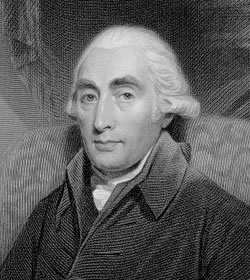
Joseph Black (1728 – 1729) is considered the father of quantitative chemistry and his research on boiling and freezing liquids revolutionized our understanding of heat. He is best known for his discoveries of carbon dioxide and latent heat.
Born in Bordeaux into a large family of Scottish wine traders, Black was educated at the University of Glasgow where he studied medicine quickly took a liking to chemistry after attending the chemistry lectures of William Cullen. In 1752 Black transferred to the University of Edinburgh to finish his medical studies. His medical thesis turned out to be one of the most important scientific papers in the history of chemistry. It centered what happened when a from of magnesium carbonate was heated. He ended up isolating the gas given off, carbon dioxide, but the real importance in his paper was that it was the first instance where anyone was taking careful, precise measurements in chemistry. This paper and his follow up lectures on it laid the basis laid the foundation for quantitative chemistry.
After obtaining a professorship at Glasgow, Black took up research on the nature of heat. By exploring phenomenon that there is no temperature change in a phase change, such as solid to liquid or a liquid to a gas, he came up with the notion of latent heat. Latent heat is then the thermal energy released or absorbed by a substance during its phase change. Heat water at 100 degrees Fahrenheit and its temperature will continually increase until the boiling point of 212 degrees Fahrenheit. Continue adding heat the the water and its temperature will stay at 212 degrees, while some it evaporates as gas. This is because all the energy added to the boiling water is being absorbed as latent heat of vaporization. When James Watt began working at Glasgow University the two became friends and Black shared his ideas on latent heat, which Watt surely used to improve his steam engines powered the industrial revolution.
Black eventually succeeded William Cullen as Professor of Medicine and Chemistry at the University of Edinburgh where he was a superb lecturer. For thirty years held this position until his failing health forced him to retire.